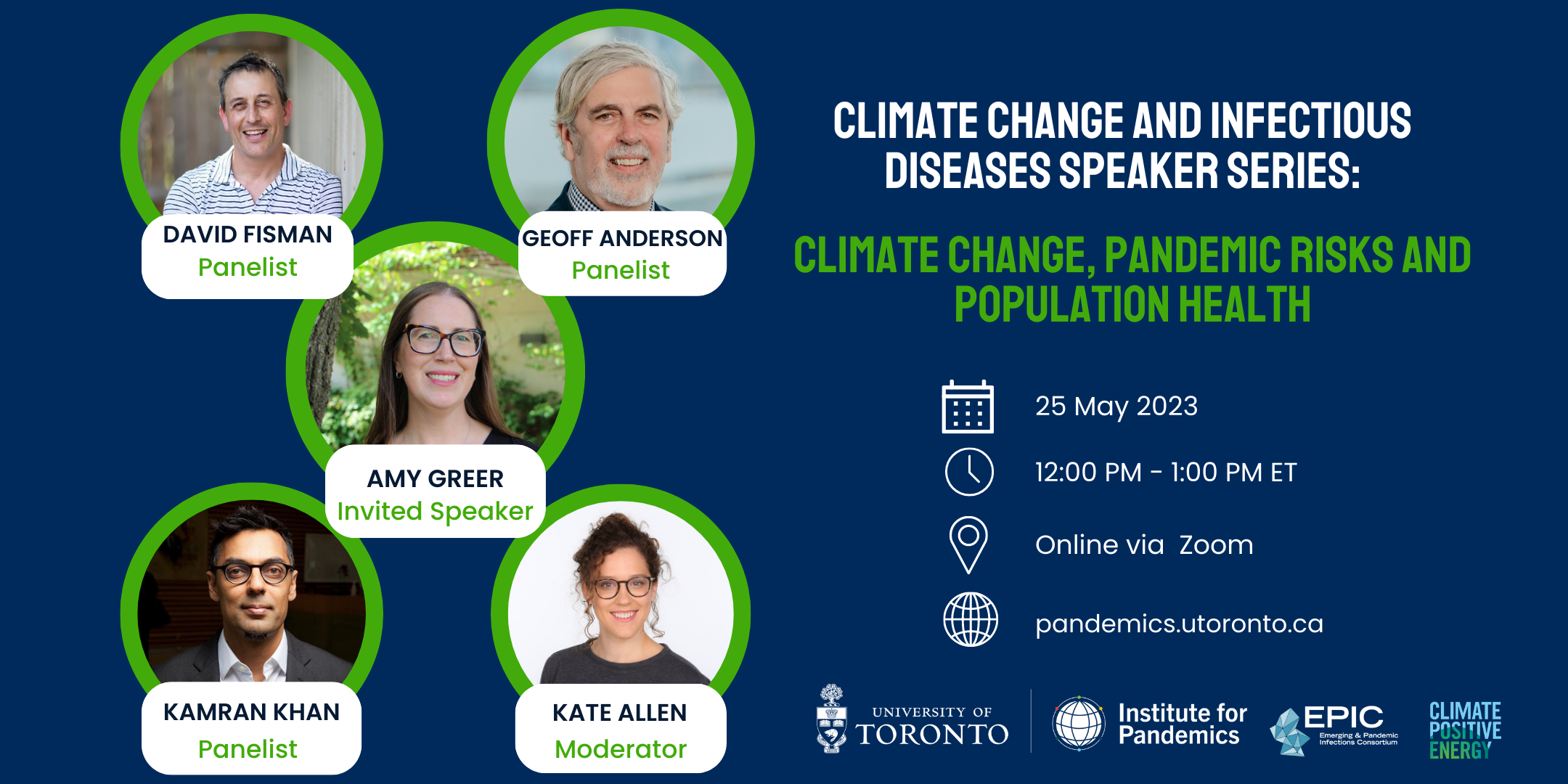
Climate Change and Infectious Diseases Speaker Series: Climate Change, Pandemic Risk and Population Health with Amy Greer, University of Guelph
How is climate change shifting and accelerating the spread of infectious diseases around the world? What are some of the impacts on societies, economics, and human and ecological health? Together with the Emerging and Pandemic Infections Consortium (EPIC) and Climate Positive Energy (CPE), the Institute for Pandemics (IfP) is pleased to co-host this public speaker series focused on climate change, infectious diseases and pandemics.
Amy Greer presented on climate change, pandemic risks and population health. Dr. Greer, who is an Associate Professor in the Department of Population Medicine at the University of Guelph, explored the ways in which climate change is impacting the health of communities around the world — including the spread of infectious diseases and risk of future pandemics.
Following the keynote, Professor Greer joined in on an insightful panel discussion with University of Toronto’s David Fisman (Professor, Dalla Lana School of Public Health), Geoff Anderson (Professor, Institute for Health Policy, Management & Evaluation), and Kamran Khan (Professor, Temerty Faculty of Medicine/Dalla Lana SPH; Founder/CEO, BlueDot), moderated by Kate Allen, the climate change reporter at The Toronto Star. Learn about the latest research findings and policy initiatives aimed at mitigating the impact of climate change, and discover what you can do to help protect public health.
About the participants

Amy Greer, PhD, MHSc, BSc holds a Canada Research Chair in Population Disease Modeling and is an Associate Professor and Director of the Graduate Program in the Department of Population Medicine at the University of Guelph. Dr. Greer’s research program explores the introduction, spread, dynamics, and control of infectious diseases in populations. She is an outbreak scientist who communicates evidence to inform decisions who orients her research investigations to practical application, working at the interface of research, public and veterinary health practice, and education.
David Fisman is a physician and epidemiologist who studies the epidemiology of infectious diseases, particularly pneumonia. His interests include laboratory datasets as epidemiological resources, mathematical modeling and simulation, infectious disease and environment/climate change, and decision/cost effectiveness analysis. Professor Fisman’s work on COVID-19 has been focused on understanding sources of variability in severity and outcomes, and in mathematical modeling to identify control strategies and optimal uses of drugs and vaccines. He has created seminal models of COVID-19 spread in Ontario that have informed policy decisions.
Kamran Khan is a practising infectious disease physician and a Professor of Medicine and Public Health at the University of Toronto, where he holds a Temerty Health Nexus Chair in Innovation and Technology. Motivated by his experiences as a frontline healthcare worker during the 2003 Toronto SARS outbreak, Kamran has been studying outbreaks of emerging and re-emerging pathogens for nearly two decades to lay the scientific foundation for a global early warning system for infectious diseases. His research has been published in leading scientific journals from the New England Journal of Medicine, the Lancet, Science, Nature, and Cell. Kamran’s work during global health emergencies such as the 2014 Ebola epidemic in West Africa and the 2016 Zika epidemic in Latin America has led him into numerous advisory roles from the World Health Organization to the White House.
Geoff Anderson is a Professor at the Institute of Health Policy, Management and Evaluation, University of Toronto. His research is focused on health outcomes in high-needs and vulnerable populations and has extensive experience in international comparisons of health policy and outcomes. He has acted as an advisor to federal and provincial governments on research and its impact. He has a PhD in Public Policy Analysis from the Rand Graduate Institute, United States, an MSc in Community Medicine from the University of Toronto, Canada, and an MD from the University of Ottawa, Canada.
Kate Allen is a reporter for the Toronto Star who writes about climate change and the environment. She has been reporting on science for more than ten years, and covered the COVID-19 pandemic beginning in January 2020. Her work has been nominated for numerous journalism awards. Her most memorable assignment was necropsying a dead, rotting blue whale that had drifted to shore on the western coast of Newfoundland. Kate studied Classics and Philosophy, including Latin and Ancient Greek, at the University of King’s College in Halifax, Nova Scotia, and holds a Masters of Journalism from the University of British Columbia. She was born and raised in Toronto and lives there still with her family.
About the series:
Through intimate and informative discussions with experts, the Climate Change and Infectious Diseases Speaker Series will focus on the effects of climate change on infectious disease burden, future pandemics and the risk to people living in Canada and abroad. The events will also highlight research advances and approaches that address this growing global public health threat. Tune in to learn more about the relationship between climate change and infectious diseases, and how you can take action through advocacy and further engagement.
Save the date for future events in the series:
June 27, 2023, 12–1pm: Impact of Climate Change on the Emergence of Pathogens in New Places with Samira Mubareka, Sunnybrook Research Institute.
About the Organizers:
The Institute for Pandemics (IfP) is a University of Toronto Institutional Strategic Initiative supported by the Dalla Lana School of Public Health, Temerty Faculty of Medicine, Faculty of Applied Science and Engineering, Faculty of Arts and Science, Rotman School of Management, University of Toronto Mississauga, and Leslie Dan Faculty of Pharmacy. IfP draws from the University’s diverse expertise to incorporate complex skill sets, from epidemiology, mathematical modelling, medicine, evolutionary biology, social sciences, pharmacy, management, engineering, to health economics and many other disciplines to address the multidimensional challenges of pandemics. We emphasize transdisciplinary research and foster cross-disciplinary learning to equip our future health leaders with broad-based knowledge and a holistic approach to tackle pandemics. The Institute seeks to transform pandemic research and training by focusing on three cross-cutting themes: Pandemic Readiness, Pandemic Resilience, and Pandemic Recovery. To join or learn more about IfP, visit pandemics.utoronto.ca or follow us on Twitter @UofT_Pandemics or LinkedIn.
The Climate Positive Energy Initiative is the University of Toronto’s centre for interdisciplinary clean energy research. Climate Positive Energy research teams are developing social, scientific, technical, economic, and policy solutions to transform energy systems, ensure equitable energy access and production, and help Canada become a global clean-energy model. CPE facilitates collaborative research, builds partnerships, promotes knowledge translation, and provides training opportunities for students and faculty. We also support existing sustainable energy and climate change initiatives across the University, including U of T’s Climate Positive Plan by 2050. CPE activity extends the University’s impact by integrating U of T’s various clean energy research and training endeavours with the University’s sustainable infrastructure projects.
The Emerging and Pandemic Infections Consortium (EPIC) is a partnership between the University of Toronto and five hospital research partners — The Hospital for Sick Children (SickKids) Research Institute, Lunenfeld-Tanenbaum Research Institute at Sinai Health, Sunnybrook Research Institute, Unity Health Toronto and the University Health Network. Building on our momentum in combating pathogens including SARS-CoV-2, EPIC brings together researchers from different disciplines to facilitate an integrated and innovative response to high-risk, high-burden infectious diseases. EPIC is Canada’s leading initiative for transformative infectious diseases research, linking academic researchers with industry and government partners, training the next generation of research leaders and advocating for science-based policies. Together, we will help prevent future pandemics and advance national and global health for decades to come. To join or learn more about EPIC, visit us online at epic.utoronto.ca or follow us on Twitter @UofTEPIC.
